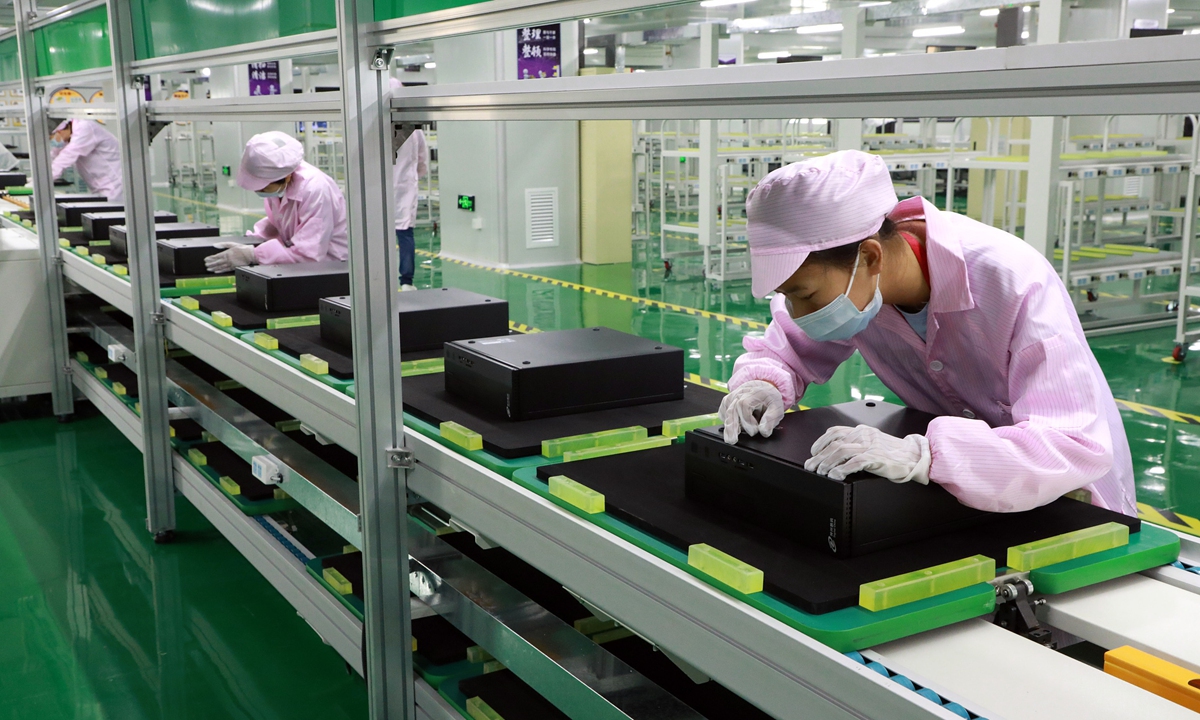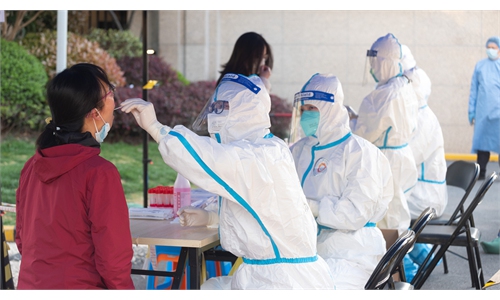
Photo:VCG
As some key manufacturing and foreign trade hubs in China are experiencing temporary difficulties due to a new wave of Omicron, some Western media have exaggerated its impact on China's foreign trade and global supply chains, by pointing their fingers at China's "Dynamic Zero COVID" policy.The Financial Times on Monday said that the dynamic coronavirus-clearing battle in Shanghai is squeezing the country's supply chain, which may spill over and impact regional supply chains. Last week the newspaper claimed that "Shanghai COVID lockdown will have a global effect on almost every trade."
It is undeniable that the Omicron outbreak in Shanghai and other regions is posing a greater-than-expected test to some industries like electronic vehicles (EV). Yet, unlike the extreme reality painted by the Western media outlets, the overall effects are fully controllable, as China is ramping up efforts to stabilize the supply chain while adopting an active anti-epidemic policy.
In fact, the foreign media's reporting on Shanghai's COVID control measures on foreign trade are highly exaggerated. There was only a small drop in the operations of Shanghai's Yangshan Port. The world's largest port still maintains an all-weather operation, making every effort to ensure the stability and normal factory operation along the Yangtze River Delta as well as the global industrial supply chains, according to media reports.
By using the Omicron outbreak to attack China's "Dynamic Zero COVID" policy on the global supply chain, those Western media outlets have distorted the facts. Since the outbreak of the COVID-19, China's active anti-epidemic policies have proven to be effective and have made great contributions to the stability of the global supply chains.
China's positive anti-epidemic policies are actually stabilizing global supply chains. Without scientific, accurate and active anti-epidemic measures, factories in China, the world's manufacturing hub and the top trader partner of more than 120 countries, will not be able to quickly resume work and production in 2020, and the already stretched global supply chain may be even tighter.
Now facing the pressure of Omicron on supply chains in Shanghai and other places, Chinese government has vowed to make every effort to ensure the smooth movement of goods and the safety of the supply chain. The action of stabilizing supply chain and stabilizing expectations has been launched rapidly, and the effect is expected to be seen soon.
During her recent inspection tour in Shanghai, Sun Chunlan, Vice Premier of the State Council, stressed that it is necessary to enhance the sense of urgency in safeguarding normal transportation and supply chain viability, asking Shanghai to do its best to support market supply of crucial industrial supplies.
And, during a meeting at the weekend, the Ministry of Transport stressed the need to "go all out to ensure efficient and smooth freight logistics," while banning unauthorized measures to disrupt transportation, including highway services center closures, and asking local authorities to provide necessary services for truck drivers.
China's National Development and Reform Commission has also announced plans to accelerate the recovery of domestic logistics sector by strengthening coordination among different departments at a meeting held with China Federation of Logistics & Purchasing (CFLP) over the weekend.
Several Chinese provinces managing COVID-19 outbreaks, including Jilin and Shandong, have swiftly acted by resuming factories' normal operation and everyday life after stamping out local community infections. Also, major automakers such as China FAW Group Corp, based in auto manufacturing hub of Jilin Province, have resumed assembling cars, local authorities said.
As China tries to strike a balance between containing the pandemic and stabilizing economic growth, any attempt to use the latest Omicron outbreak to attack China's anti-virus policy, slander China's economy, and instigate a switch of the industrial chain are ill-willed and will not succeed.



